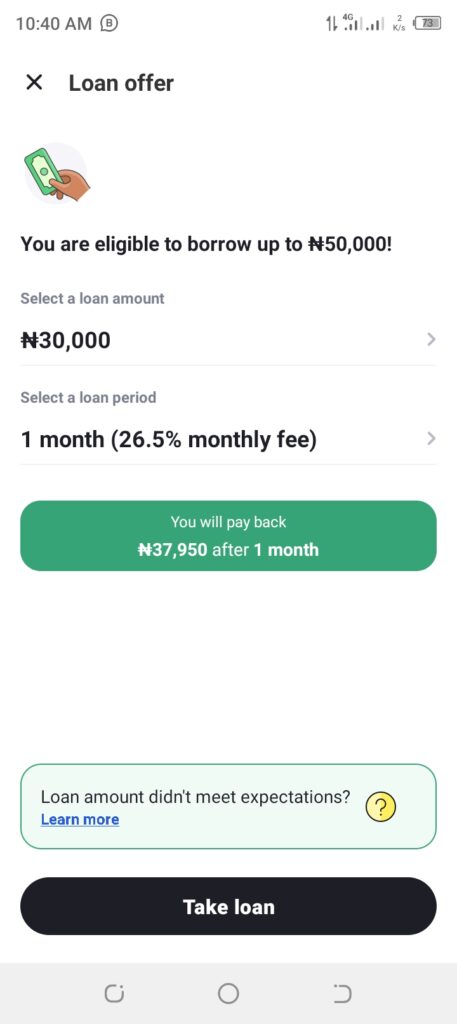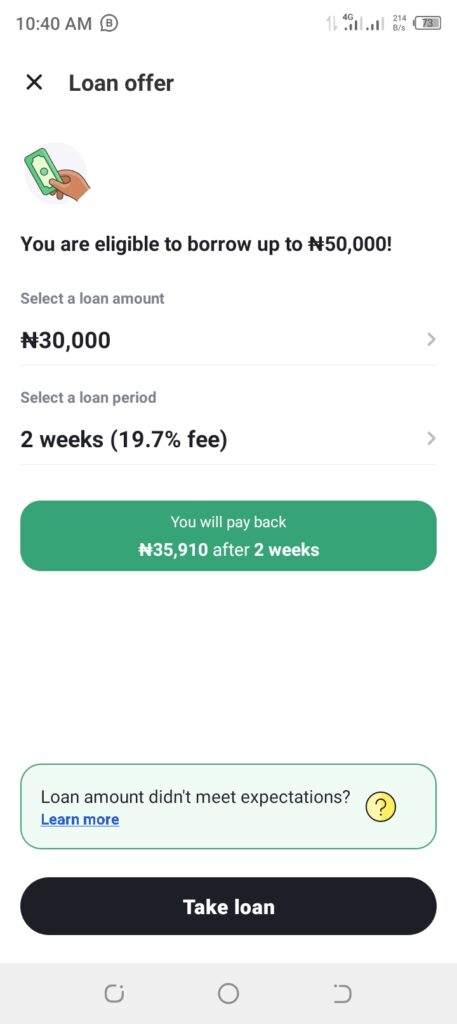Loan apps torment users in Nigeria despite being barred by government, Google
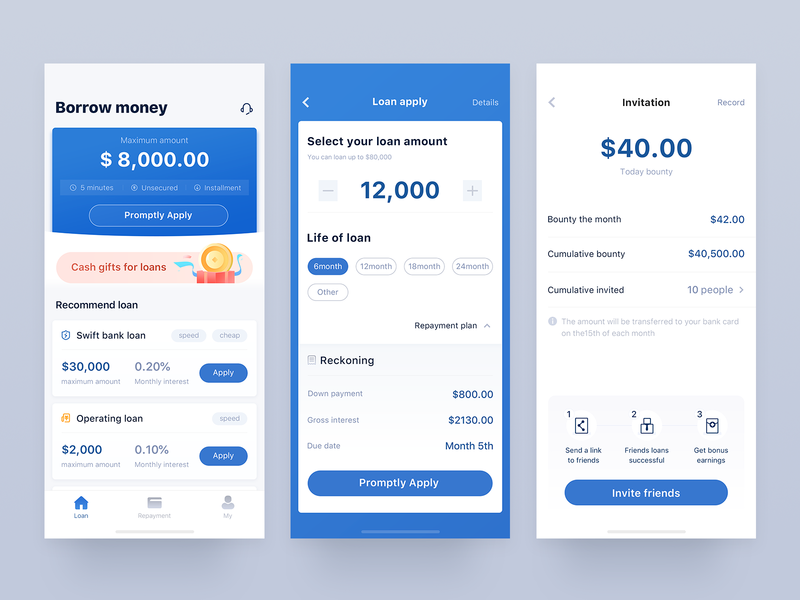
Key Points:
-
Loan app operators still violate data privacy of borrowers despite government regulation
-
App operators take advantage of unsuspecting, desperate borrowers
-
Interest rates on the apps are extremely high
-
Citizens must take their data privacy seriously
-
Avoid patronizing loan sharks; report violators to relevant security agencies
By Daniel Adaji
Michael Adekunle, a young Nigerian, who had just graduated from a higher institution but had no job yet was a victim of some of these apps. According to him, he was very hungry and lacked support that he decided to patronize ‘Palm Credit.’ He borrowed N7, 000 to pay back about N9,000 in three weeks (26% interest) but was unable to meet up with the payment terms. Having defaulted in payment, he started receiving demeaning text messages and calls from the loan operators. He had to patronize another loan app in order to pay. He said that was how he became a ‘captive’ of multiple loan apps in the country.
“Borrowing money from any loan app in any part of the world would be the last thing I would ever do but hunger led me to where I am today. On a particular day, I was at home with my sibling and there was no food. I had just graduated from the university and completed the compulsory National Youth Service Corps, but no job yet.
“I had been seeing the advertisement of some of these apps on my phone so I decided to patronize ‘Palm Credit’, among others. At first, it was a nice experience or so I thought because I was desperate to quench the hunger in my stomach, but little did I know that I was digging my financial grave. On the date to pay back about N9, 000 for N7, 000 after three weeks I defaulted for lack of money and was under pressure from the lenders, including threats to report me as a fraudster to everyone on my contact list; coming to my house to arrest me. I was so depressed and frustrated that I had to patronize another loan app Fairmoney in order to pay them back. That is how the cycle has continued till date,” Michael said.
- A Fairmoney app interface for borrowers. Photocredit: The Insight
Michael is not the only one whose mental health have been threatened by the unscrupulous operators of these apps, as it was the same for every borrower especially defaulters. To think that the apps go ahead to publicize the obituary of their victims is bad enough, but to even threaten that they would report defaulters to the Nigeria financial authorities after violating the fundamental right of citizens makes one think if they actually operate within the ambit of the law or are immune to the legal consequence of their actions.
Borrowing money from any loan app in any part of the world would be the last thing I would ever do but hunger led me to where I am today
Another user Muhammed Isah on the 9jacash loan app complained that despite repaying the loan, the repayment was not effected on the app, while he was still asked to make another payment.
In his word “I don’t understand what’s happening. I repaid my loan the following day I took the loan, I was debited but up till date the loan amount is still on the app, asking me to repay, and there is no number to contact anywhere. This is annoying. I have my payment proof. I sent a mail to the customer service, but there was no response. It’s not funny,” he stated.
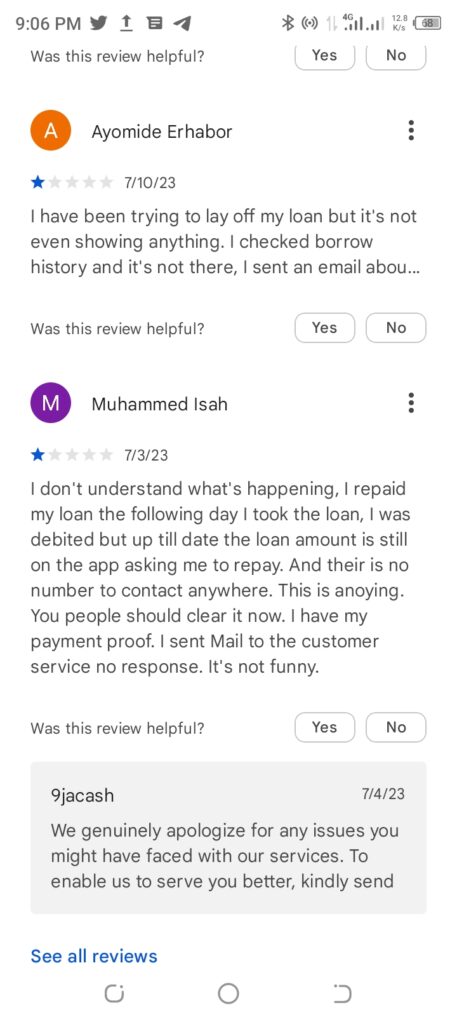
9ja cash review on Play Store. Photocredit: The Insight
The case was not different from Joy Cash-Loan app where Paulina Udoh cried out that the app operators were fraudulent.
“Please don’t go near this app… they are fraudulent. I log in for the loan and 35k showed. Without any confirmation, N31, 950 was transferred to my account and the repayment was well spelt out. They are asking me for over 40 percent within 28 days with four payment options. I quickly sent a mail to them, asking for details to return the money and refunded their money immediately; they are still asking for 30 percent.…Be all aware,” she said.
Loan apps have become the nightmare of many borrowers in Nigeria as default in payment could lead to more traumatic experiences than they envisaged. The apps which have been waxing stronger in their dehumanizing method of handling defaulters have been barred by the Federal Government of Nigeria and Google from accessing the contact and photos of their customers/borrowers with effect from 31 May 2023.
Google, in April 2023 updated it policy on loan apps on play store. The policy was to address some of the issues faced by the apps users in some countries including Nigeria. The new policy prohibits personal loan apps from accessing user contacts or photos. Google mandates that the lenders meet up with some requirements including the submission of country-specific licensing documentation to prove their ability to provide or facilitate personal loans.
The updated policy follows Google’s recent announcement of updates to its Developer Programme Policy. This update mandates digital money lenders in Nigeria, India, Indonesia, the Philippines, and Kenya to conform to regulatory rules or face removal from the Play Store by January 31.
In March 2023, Nigerian federal government agencies—Federal Competition and Consumer Protection Commission (FCCPC), National Information and Technology Development Agency (NITDA), and the Independent Corrupt Practices and Related Offences Commission (ICPC)—collaborated with the Nigerian police force to raid some illegal financial institutions operating from their Opebi Road offices in Ikeja, Lagos, Nigeria. Among those raided were GoCash, Okash, EasyCredit, Easi Moni, KashKash, and Speedy Choice. The operation was in response to a complaint response to several customers’ complaints about the malpractices carried out by financial institutions.
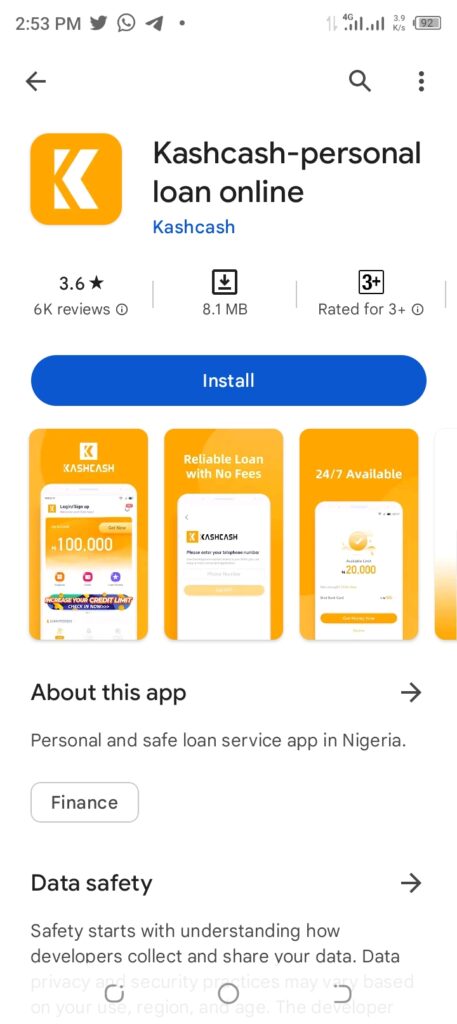
Some of the apps still on Google Play Store. Photocredit: The Insight
Despite the crackdown on these apps, they are still accessible on Google Play Store and as ads on the internet and charge extremely high interest rates to borrowers with defaulters risking their data privacy to the merciless operators.
These apps (KashKash, Go cash among others) were also listed among the fake apps in Nigeria by wefinders24 an online repository of fake loan apps in the country.
Similar to Nigeria, some loan app operators in Ghana operate without license; they also torment borrowers by infringement on their data protection right. However, over 400 of such operators have been arrested to serve as deterrence to others.
No fewer than 173 digital lending applications have been approved to operate in Nigeria by the Federal Competition and Consumer Protection Commission. The Insight gathered that of the 173 loan apps, only 119 have full approvals while 54 currently have conditional approvals but are bared from illegal online bank operation.
To operate a loan app, the commission gave some set of guidelines to follow, which include:
Name of Digital Money Lender
Telephone Numbers
A physical office
Source of funding
Email Address
Website
Identity and nationality of promoters, directors and initial key role players
Affiliations with any other companies, institutions or similar businesses, whether domestic, regional or global
Consultants, agents, or any person assisting with registration process, operations, or management
Bankers
Proposed interest rate regime and loan balance calculation methodologies
Any licenses authorising business to operate; and
List of all apps in operation or intended for operation
However, a thorough check on select loan apps on Play Store revealed that many of the identified apps do not follow all the procedures.
For instance, Joycash loan app operated by Joycash Finance Limited is not listed among the approved platforms and has no specific office address (Ikeja GRA, Lagos State, Nigeria) and website: https://www.joycash.cc/home and email: help@joycash.cc. The Insight conducted a search on the Corporate Affairs Commission’s website and found out that the company was not registered as the time of this report.
Joy Cash app: Photocredit: The Insight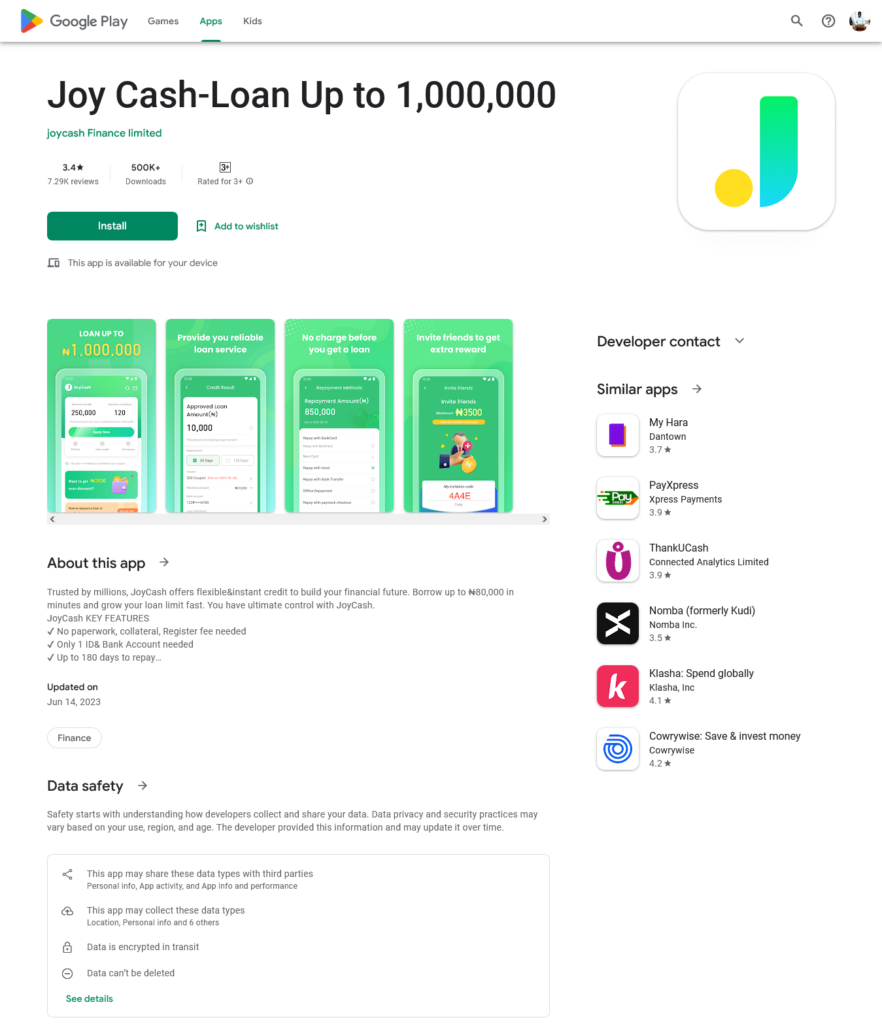
The same goes with Fast Cash Instant Loan App operated by Automax Finance Network. It is not among the approved list but hosted on the Google play store despite the requirement to meet up with country-specific regulations.
The FCCPC document is open source and accessible to the lenders online but they have continued to carry out operations without adhering to these guidelines.
Some of the lenders subtly included that the unsuspecting customers subscribe to their personal contacts being assessed. This is usually a trap set by most operators especially knowing that most desperate users do not read their terms.
Some of the tricky terms used by the loan shark to lure the borrowers into consenting to the sharing of their data. Credit: The Insight
The data privacy and mental health of many desperate and unsuspecting Nigerians who use these platforms would be at stake if these operators are allowed to continue unchecked.
The Central Bank of Nigeria (CBN) had cautioned Nigerians against seeking credit facilities from loan sharks for financial purposes.
According to a report, the CBN was quoted saying that Nigerians should desist from patronizing loan sharks.
“On loan sharks, what we have done is to say that there is no need for you to go to loan sharks for a loan,” he said. “People normally will go to loan sharks because they are desperate, they cannot access the bank.
“We found in this group, mainly people who are vulnerable; the people whose households need some small amount of money to do their businesses but they cannot access bank finance and as a result go to loan sharks who charge them … twice the principal just within 90 days and if you don’t, they seize your property or seize your bicycle,” the report said.
Some of the lenders subtly included that the unsuspecting customers subscribe to their personal contacts being assessed
Despite the warning, many Nigerians still patronize these operators due to desperation and their wide awareness campaign which remained unchecked in the country.
It is necessary therefore for citizens to know what measures to take when they are harassed by these ‘undoers’.
According to a publication, it is recommended that those who have borrowed from the app operators and are yet to pay should adopt the following measures:
Be calm: As an individual who borrowed money and yet to pay or complete payment, it is important to remain calm amidst the situation. Do not lose your anger. Even though it is difficult during this situation, you mustn’t lose your temper or anger.
Report to authorities and seek legal advice: In a situation where the defaulter is being threatened against their life, It is very necessary to report to relevant law enforcement agencies. Where one is unsure how to go about it, a law practitioner could be of help.
Attend meetings in public spaces: Borrowers are advised to avoid meeting with loan sharks in secluded or secret places. Instead agree to meeting in a well-known place and arrive there in good time if it becomes necessary.
The best way to avoid loan sharks is by not getting loans from them at all.
According to an expert, Mr. Lekan Afolabi in a report published online, good knowledge of data privacy is very important to avoid being ensnared by the loan providers.
“A person, who has in-depth knowledge of the consequences of data privacy means, would not just allow these companies to have access to his contacts and other sensitive information about him/herself.”
“Now for the company, you should not collect third party information from an individual. A loan company should not say that they have requested consent from a customer to share my data. And a loan company should not get my private information from their customer backing their action that they have requested my data without my consent; that is not consent. This is why a company like Soko Loans was fined by NITDA,” he said
Mr Afolabi also proffered that government agencies such as the Ministry of Digital Economy and NITDA should ensure awareness programmes are carried out to educate Nigerians on data privacy and protection.
The Insight Report
Nigeria Coverage

